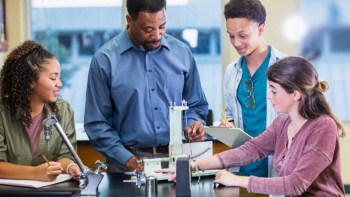Skills learnt as part of a research team translate well to a career as a leader in education says physicist and headteacher Mark Whalley

Much is written about the shortage of physics graduates entering teaching, about how many children are never taught physics by a subject-specialist and about the need for more pupils to pursue physics beyond school. But there is another area of crisis in schools and that is leadership. Filling leadership posts is becoming increasingly challenging, especially at the top of the profession. Now is a time full of opportunities and for those with the potential and the skills, leadership in schools could be the perfect career path.
There are opportunities for the full range of physics graduates in teaching, but for those with research or postgraduate experience the prospects may be even better. Reflecting on my own career, the PhD itself wasn’t the key factor in helping me move up the different levels of the education profession. Instead it was the range of skills gained during that postgraduate degree that laid the foundations for leadership success.
After graduating in 1990 I spent three years doing a PhD in particle physics at the University of Birmingham, UK, while working on the OPAL experiment at the Large Electron–Positron Collider at the CERN particle-physics laboratory in Geneva, Switzerland. After receiving my doctorate, I trained to be a teacher for a year before returning to do a postdoctoral degree in biophysics. Three years later, I began my teaching career in a challenging comprehensive (secondary) school. Within a year or so, I had my first low-level leadership role as an assistant headteacher in a large school, reaching headship four years ago.
Despite leaving research for a full-time career as an educator, it was my experience while still a part of research teams that equipped me with key skills and ultimately helped forge my leadership. At the heart of my research life was the teamwork necessary for the functioning of any experimental project. The size of a team varied over my research life, from small teams of three to large detector groups at CERN. A common factor in any of these settings that amazed me, and still does, was the level of democracy and inclusiveness shown within the team. Young, inexperienced voices were heard and given the opportunity to speak by those with years of expertise, acknowledging that age on its own was no guarantee of creativity and innovation. While the implicit hierarchy was always there – maintained by respect for those above you – everyone felt valued and a part of something bigger.
The lessons learnt during that time have served me well throughout my school leadership career. Collaborative approaches within leadership engender shared ownership and this, in turn, ensures all those in a team feel valued. Treating those who work for you as intellectual equals produces commitment, while failure to do so produces resentment. The best leaders in education know this, and they share their authority, invest in their colleagues and place faith in the ability of others. The worst exercise power, alienate their colleagues and encourage division rather than unity.
But there are a range of other skills developed in my research years that are worth mentioning. Effective school leaders must be analytical. Though much of school leadership is about “soft skills”, and there is still a great deal that is analytical. Judging pupil performance and teacher effectiveness, handling budgets and writing timetables all require a logical and analytical mind. As the job often entails having to deal with challenging “human” issues involving children, parents and staff, one benefits from a calm, rational and analytical approach. Schools themselves operate within legal, social and technical frameworks and dealing with the requirements of inspections, legislation and even school-management systems all benefit from detached and abstract approaches often found in the world of research.
School leaders must also be extremely comfortable with data. Don’t get me wrong, I would not suggest that the data processing required in a school equates to that required at the Large Hadron Collider, but the ability to confidently and reliably handle and interpret large data sets is a key skill of a leader in education. Many, if not most, schools are data-driven and mastery of data analysis and statistics will give you a distinct advantage over colleagues with less experience in the area. Data are the lifeblood of schools and, though often shunned as the impersonal and regrettable side of the profession, they are at the heart of education and unlikely to take a back seat any time soon. Indeed, I recall a meeting with a school inspector during which we discussed the school’s progress data. I was able to illustrate and argue points using a range of statistical tools that are rarely found in an inspector’s tool kit. This helped my school through an inspection and did my career no harm at all.
Throughout my postgraduate career, I also honed my presentation skills. From my first talk at CERN during the first term of my PhD, through to lectures as a postdoc, I spent a lot of time planning and delivering talks to expert audiences both small and large. The ability to talk with confidence to a range of audiences is a key skill of school leaders. Whether you are addressing your science department, a whole body of staff or 300 parents, you need the confidence and experience to speak eloquently and convincingly. You are judged by this – you may well be the finest school manager, but fail in front of a critical audience and your credibility is out of the window. Allied to this is the ability to communicate complex ideas. Physics is complex and even with fellow physicists you will surely have to explain your own niche areas. Many issues in schools are extremely complex, made more so by the simple fact that they do not obey the laws of physics. So while you may not be explaining quantum field theory to a parent, I would say that explaining the latest guidance from the UK Department of Education on measuring progress to 100 parents comes a close second.
Having gone through some of the reasons that school leadership offers opportunities for physicists I should issue a caveat or two. Your teams will rarely contain others with backgrounds in physics, even if you are running a science department, so don’t be surprised if you are the only physicist in the room. We are trained in a unique discipline and we do tend to think in a particular way; do not expect your colleagues to think like you or necessarily even understand. Physicists have the potential to make great school leaders, but I wouldn’t like to see a school run by half a dozen of them! Your colleagues will be experienced, intelligent professionals, with equally valuable but potentially very different skill-sets to those you possess. It is this diversity – which is a strength and should always be encouraged – that makes school leadership teams work.
Every child, teacher, parent and community is unique, as is every situation; a consequence of which is that every leadership challenge is distinctive. Coupled to this is the fact that every school leader is unique when it comes to their own values, beliefs, experience, knowledge and expertise. Consequently there is no simple checklist to determine whether you could be a successful school leader, but for those pursuing postgraduate physics and looking for a meaningful career beyond universities and laboratories, school leadership may offer a rewarding future.
- Enjoy the rest of the March 2017 issue of Physics World in our digital magazine or via the Physics World app for any iOS or Android smartphone or tablet. Membership of the Institute of Physics required


